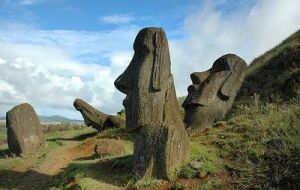MercoPress. South Atlantic News Agency
Chile’s Peaceable Kingdom Image Challenged

by COHA Research Associates Joss Douglas and Samantha Nadler
On the tiny, legendary Pacific speck of land known as Easter Island, located 2,000 miles from the Chilean coastline, the ongoing non-violent protests being staged by the Hito family at the Hotel Hanga Roa came to a climax on Sunday February 6, 2011. Fifty armed members of the Chilean national police force (los Carabineros) mounted an illegal raid on the hotel and forcefully evicted the family that has occupied the grounds since August 2010. This action was in direct violation of a judicial order against their dislodgement
Easter Island’s indigenous people, the Rapa Nui, boast a rich culture and mythology, which continues to occupy a central place among the island’s some 36 clans. The greatest modern-day remnants of the island’s history are the enormous, monolithic Moai statues that litter the coastline, which have today become the island’s top draw card for tourists. While it is estimated that there were once approximately 10,000 people living on Easter Island, today the island’s population rests at around 3,500 (although this figure is somewhat unclear given the constant migration of Chileans to the island primarily to work in the tourism industry). Since its annexation to Chile in 1888, the Rapa Nui have been forced to re-evaluate their identity, particularly since 1966 when Santiago conferred Chilean citizenship on the group. In recent years, a growing chorus of supporters—both national and international—has argued that Rapa Nui must begin the path of self-determination.
The Hito family, a clan of the native Rapa Nui islanders, has been protesting the construction of various tourist attractions around the island, claiming that such facilities were built on ancestral lands. They allege that the terrain was swindled from their illiterate ancestors’ generations ago, and subsequently was consigned illegally into private hands during the era of the Pinochet dictatorship. For the past six months, as many as 50 Hito clan members have been occupying the luxury resort development at Hanga Roa (estimated to be worth USD 50 million), demanding recognition and of their ancestral property rights.
The six-month long protest first turned violent in December 2010 when the Chilean government called upon its military to forcefully remove the Rapa Nui squatters. More than twenty of them were reported injured after the police, armed with pellet guns, attempted to clear protesters from the demonstration site. Since December, various international observers have voiced concern for Easter Island natives. UN Rapporteur on the Rights of Indigenous Peoples, James Anaya; U.S. Senator Daniel Akaka of Hawaii; American Samoa’s delegate to US Congress, Eni Faleomavaega; and members of the Inter-American Commission for Human Rights, are all urging the Chilean president to avoid any preventative action of a violent nature.
According to its proponents, the construction of the hotel project would improve the now austere lives of the islanders by increasing tourism, creating jobs, and giving the island a much-needed economic boost. As a UNESCO World Heritage Site, tourism remains the number one industry on Easter Island. At the same time, the Rapa Nui fear that the massive influx of tourists will lead to further Chilean assimilation, environmental destruction, and ultimately the erosion of their culture and traditions. Despite international resolutions to protect indigenous land rights—such as the UN’s 2007 Declaration on the Rights of Indigenous Peoples, of which Chile is a signatory—Santiago authorities seem indifferent, if not actually hostile, toward the indigenous people of Easter Island and the worldwide concerns aimed at safeguarding their heritage.




Top Comments
Disclaimer & comment rulesCommenting for this story is now closed.
If you have a Facebook account, become a fan and comment on our Facebook Page!